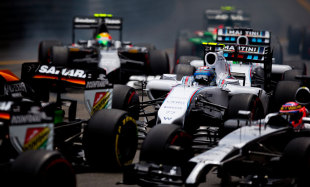

While consistency might seem a little dull, allied as it is with stability, dependability, and reliability, in sport it is consistency that gets results. To finish first, first you have to finish, and to annihilate the competition and dominate a season it is the regular results that matter.
Formula One understands this inherently in the context of racing, but seems to have absolutely no idea what it's doing in its dealings with the world at large. We want to be sustainable, so we create brilliant new power units and then Ratner all over them. We want to cut costs, so we bring back in-season testing. We want to ensure up and coming drivers are equipped to make the move to Formula One, so we debate getting rid of the only part of the race weekend that gives newbies track time.
And then, when we've made these brilliant and logical decisions, we turn around a few minutes later and decide to scrap them.
There is nothing wrong with being adaptive and responsive, with trying out new ideas and abandoning those concepts that don't work. That is how progress is made, after all. But the past two years have been less reactive and more running around in circles like a dog chasing its tail.
It cannot be denied that something needs to be done to rein in F1 spending. Not only will cost controls (or just simple cost reduction) be of benefit to those teams currently in the sport yet struggling to survive, but it is also good PR. To the outside world Formula One is still largely seen as an over-bloated financial abyss, profligate both with our own money and with the world's limited natural resources.
Changing that perception is an uphill battle, but it is one we must try to win. And we won't win it if we keep changing the message.
We banned in-season testing to cut costs, then we brought it back, and now we're debating dropping it again to cut costs. It makes sense, but it also makes us look a little foolish. It shows a lack of clarity and forward thinking from key decision-makers with regard to long-term planning, which in turn makes Formula One look like an unreliable prospect.
In theory, the F1 Strategy Group should prevent these regular about-faces, taking a long-term view of how to strengthen and improve Formula One over the years and decades to come. But as the cost cap controversy made painfully clear, the group tasked with safeguarding the future of the sport can't see past the end of their own noses.
They are also not shy of making decisions - such as the cost cap debacle - that are guaranteed to lead to widespread media criticism and negativity. The sport may not have been brought into disrepute when the cost cap was casually cast aside, but we were left with egg on our face.
But there is one recent decision that should be undone, for the good of the sport. Disband the current F1 Strategy Group, and return to a system whereby all teams had a voice. All might not be fair in love and war, but motorsport is neither. Because it is only when decisions are influenced by all stakeholders that we shall have any hope of sticking to them, of presenting a consistent and reliable face to the world at large.
